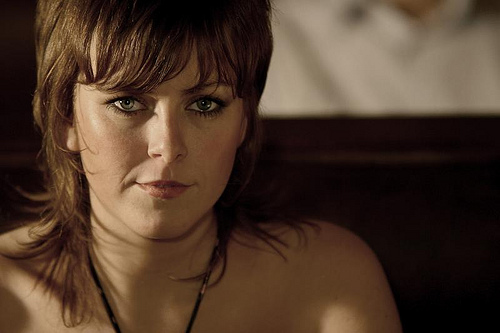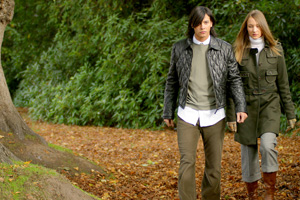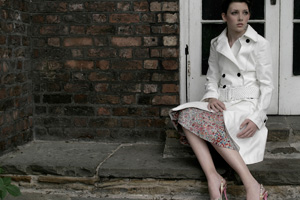It is relatively self-explanatory that doing a photo critique is quite difficult. What few people stop to think about, however, is that receiving a photo critique can be as difficult – if not more difficult: When you move beyond mere snapshots and start putting more of yourself into your photographs, you are a lot more intimately involved with the work you are putting out there.
Putting your photos up for criticism – whether it is at your local photography club, via a site such as DeviantArt, or even when asking a good friend to give some feed-back – is like putting your own head in the guillotine and taking a chance.
Nonetheless, it’s one of the best ways to improve as a photographer, and one of the best lessons you’ll learn is to discover how to deal with negative photo critiques…

Hayley in the 1950s by Photocritic.org, on Flickr
1) It may come across as crass, rude, or wrong, but there may be a kernel of truth in it.
 If someone tells you “LOL learn how 2 autofocus, you dweeb”, you need to do 2 things: Live in the happy knowledge that whilst your camera might have had an off day, at least you know how to string a grammatically correct sentence together.
If someone tells you “LOL learn how 2 autofocus, you dweeb”, you need to do 2 things: Live in the happy knowledge that whilst your camera might have had an off day, at least you know how to string a grammatically correct sentence together.
And perhaps that picture is a little bit blurry, now that you look at it closely…
Take a step back, and take commentary on face value. If you honestly can’t say you agree with a piece of criticism, that’s perfectly fine, as long as you are objective enough to be able to try and see it from their viewpoint.
2) They might disagree, but they are your audience.
 Ultimately, you are the photographer, and what you decide is how the final result gets done. Nobody can tell you what to do, and if you like your photo, then you’ve won one of the huge battles.
Ultimately, you are the photographer, and what you decide is how the final result gets done. Nobody can tell you what to do, and if you like your photo, then you’ve won one of the huge battles.
At the same time, it’s quite possible that the people ripping your photos to shreds are the people you were trying to target: whether you’re thinking about selling them as microstock, as art works, or just to give your mum a present is irrelevant.
Your photos are out there for interpretation, and if you care about the message you are sending, you’ll have to go the extra mile to make sure that they aren’t getting misinterpreted.
3) As soon as you let ‘em go, you no longer own ‘em.
 It’s the curse of all writers and poets: They spend months – years, even – crafting their masterpiece, and then nobody ‘gets’ it. They all ‘get it’ wrong. Tell you what though, that’s where part of the beauty comes from: If you are taking a photo which you meant to symbolise the innocence of youth, and your first 10 commenters feel it’s a strong commentary on, say, child abuse, then they are per definition right.
It’s the curse of all writers and poets: They spend months – years, even – crafting their masterpiece, and then nobody ‘gets’ it. They all ‘get it’ wrong. Tell you what though, that’s where part of the beauty comes from: If you are taking a photo which you meant to symbolise the innocence of youth, and your first 10 commenters feel it’s a strong commentary on, say, child abuse, then they are per definition right.
It is not your job to interpret your own photographs, it is your job to take them. This is a good thing: if people can make up their own story to go with the photograph – their own connotations and bias, as it were – they are much more likely to connect emotionally with the photograph. If this is achieved; if someone is caused to feel something because of your photo; your mission is complete.
4) They talk. You shut up.
 Remember that, just like you are not there to interpret your work, you’re not there to defend it either.
Remember that, just like you are not there to interpret your work, you’re not there to defend it either.
In a way, the best thing you can do is to never respond to any criticism. Let’s be honest – you will never be able to re-create the EXACT same image ever again anyway. Take the criticisms on board as points of reference for future photographs.
Learn from your mistakes, learn about what makes your audience buzz, and learn from your own opinions of your work.
5) Remember that the best works might be universally hated: Be thick-skinned.
 Technical aspects of your photographs might be objective: A photo can be accidentally over-exposed, blurry, or have some rubbish in the background which makes your photograph less-than-perfect. Once you start killing the technical foibles of your photographic work one by one (don’t go too perfectionist on it though, it’s not useful to end up deleting all of your photos because of every little detail), the actual creative work starts shining through, and this is where the worst potential for getting hurt comes from.
Technical aspects of your photographs might be objective: A photo can be accidentally over-exposed, blurry, or have some rubbish in the background which makes your photograph less-than-perfect. Once you start killing the technical foibles of your photographic work one by one (don’t go too perfectionist on it though, it’s not useful to end up deleting all of your photos because of every little detail), the actual creative work starts shining through, and this is where the worst potential for getting hurt comes from.
You can kick yourself for small technical mistakes in your photographs (and you’ll continue making them for the rest of your photographic career), but if people start critiquing your artistic choices, it’s a different thing altogether.
The important thing here is to believe in your own work 100%: If you feel you’ve done it right, and if the image is an accurate representation of what you were trying to do, then all you can do is to shrug off their comments and move on.
Just think about it: Pink Floyd, The Decemberists, Pendulum, Metallica, Billy Joel, Leonard Cohen, Zero 7 – they’ve all been called ‘the best band ever’ by reviewers at one point or another, and yet it is never difficult to find someone who doesn’t care about – or even actively dislikes – them.
Do you enjoy a smattering of random photography links? Well, squire, I welcome thee to join me on Twitter - Follow @Photocritic
© Kamps Consulting Ltd. This article is licenced for use on Pixiq only. Please do not reproduce wholly or in part without a license. More info.
